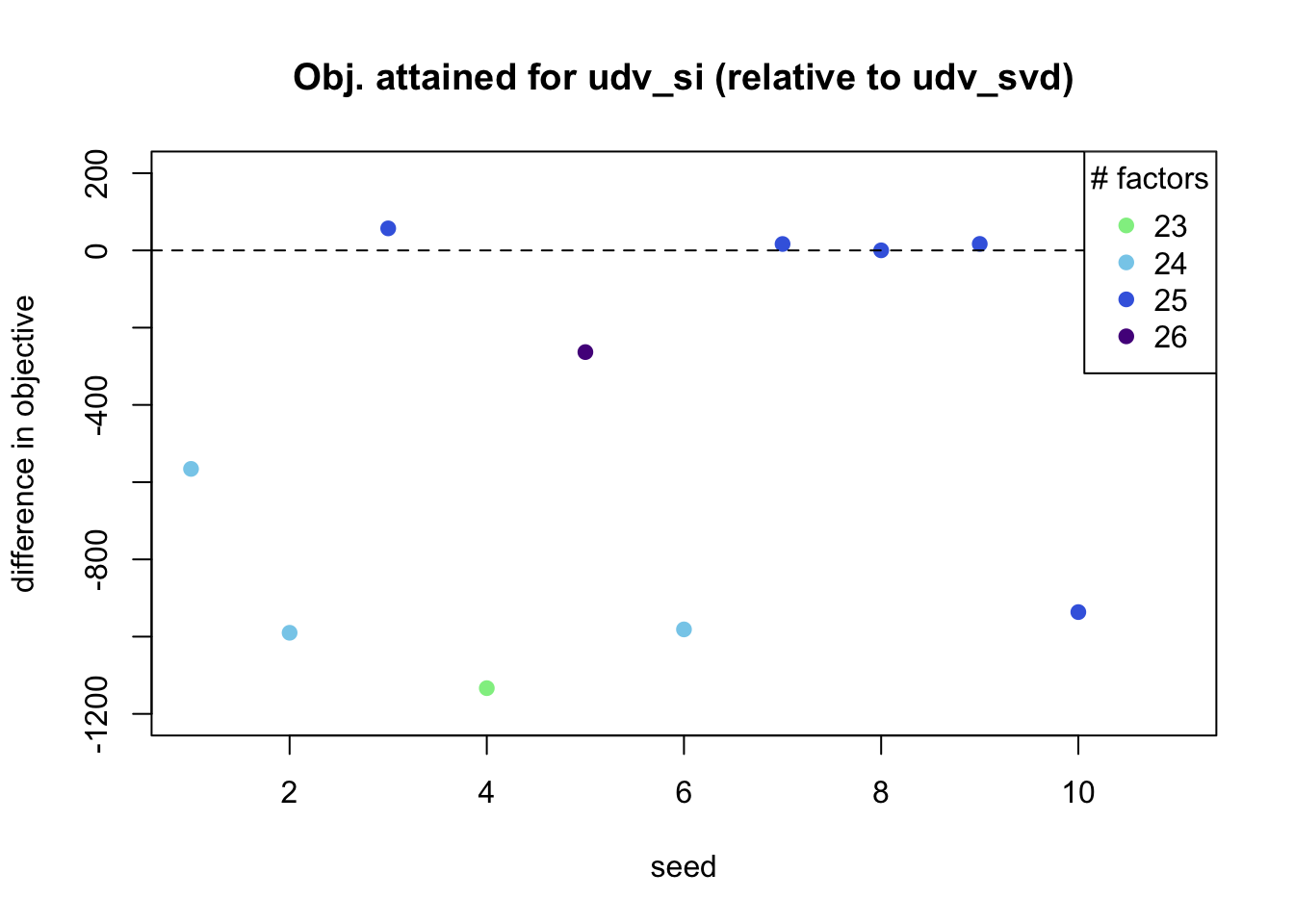Effect of initialization function on final objective
Jason Willwerscheid
7/26/2018
Last updated: 2018-07-27
workflowr checks: (Click a bullet for more information)-
✔ R Markdown file: up-to-date
Great! Since the R Markdown file has been committed to the Git repository, you know the exact version of the code that produced these results.
-
✔ Environment: empty
Great job! The global environment was empty. Objects defined in the global environment can affect the analysis in your R Markdown file in unknown ways. For reproduciblity it’s best to always run the code in an empty environment.
-
✔ Seed:
set.seed(20180714)The command
set.seed(20180714)was run prior to running the code in the R Markdown file. Setting a seed ensures that any results that rely on randomness, e.g. subsampling or permutations, are reproducible. -
✔ Session information: recorded
Great job! Recording the operating system, R version, and package versions is critical for reproducibility.
-
Great! You are using Git for version control. Tracking code development and connecting the code version to the results is critical for reproducibility. The version displayed above was the version of the Git repository at the time these results were generated.✔ Repository version: f497f36
Note that you need to be careful to ensure that all relevant files for the analysis have been committed to Git prior to generating the results (you can usewflow_publishorwflow_git_commit). workflowr only checks the R Markdown file, but you know if there are other scripts or data files that it depends on. Below is the status of the Git repository when the results were generated:
Note that any generated files, e.g. HTML, png, CSS, etc., are not included in this status report because it is ok for generated content to have uncommitted changes.Ignored files: Ignored: .DS_Store Ignored: .Rhistory Ignored: .Rproj.user/ Ignored: docs/.DS_Store Ignored: docs/figure/.DS_Store Untracked files: Untracked: data/greedy19.rds
Expand here to see past versions:
Introduction
Here, I return to a question I asked in a previous investigation: does the choice of init_fn affect the final objective attained?
I perform a very simple (if time-consuming) experiment. I fit FLASH to the GTEx dataset from previous investigations using init_fn = udv_si with ten different seeds, and compare the final objective in each case to the objective I get using init_fn = udv_svd.
Results
I pre-run the code and load the results from file. I am using warmstarts to avoid the problem described here (at present, this functionality is only available in branch trackObj).
# devtools::install_github("stephenslab/flashr", ref="trackObj")
devtools::load_all("/Users/willwerscheid/GitHub/flashr")
# devtools::install_github("stephenslab/ebnm")
devtools::load_all("/Users/willwerscheid/GitHub/ebnm")
gtex <- readRDS(gzcon(url("https://github.com/stephenslab/gtexresults/blob/master/data/MatrixEQTLSumStats.Portable.Z.rds?raw=TRUE")))
strong <- t(gtex$strong.z)
niter <- 10
obj.udv_si <- rep(0, niter)
nfactor.udv_si <- rep(0, niter)
for (i in 1:niter) {
res <- flash_add_greedy(strong, Kmax=50, init_fn="udv_si",
warmstart=TRUE, verbose=TRUE, seed=i)
obj.udv_si[i] <- flash_get_objective(strong, res$f)
nfactor.udv_si[i] <- flash_get_nfactors(res$f)
}
res2 <- flash_add_greedy(strong, Kmax=50, init_fn="udv_svd",
warmstart=TRUE, verbose=TRUE, seed=i)
obj.udv_svd <- flash_get_objective(strong, res2$f)
nfactor.udv_svd <- flash_get_nfactors(res2$f)
all_res <- list(obj.udv_si = obj.udv_si,
obj.udv_svd = obj.udv_svd,
nfactor.udv_si = nfactor.udv_si)
nfactor.udv_svd = nfactor.udv_svd)
saveRDS(all_res, "../data/init_fn2/res.rds")all_res <- readRDS("./data/init_fn2/res.rds")Results are as follows.
obj.diff <- all_res$obj.udv_si - all_res$obj.udv_svd
col <- c("lightgreen", "skyblue", "royalblue", "purple4")
plot.col <- col[all_res$nfactor.udv_si - 22]
plot(1:10, obj.diff,
xlab="seed", ylab="difference in objective",
xlim=c(1, 11), ylim=c(-1200, 200),
pch=19, col=plot.col,
main="Obj. attained for udv_si (relative to udv_svd)")
abline(0, 0, lty=2)
legend("topright", as.character(23:26), pch=19, col=col,
title="# factors")
Expand here to see past versions of show_results-1.png:
| Version | Author | Date |
|---|---|---|
| 974e1db | Jason Willwerscheid | 2018-07-27 |
So, six seeds yield an objective that is much worse than the objective attained using udv_svd, and four seeds yield an objective that is as good or slightly better. The latter all include 25 factor/loading pairs, which is also the number of factor/loading pairs given by udv_svd.
Conclusions
These results lend further support to my previous conclusion that we should make udv_svd the default initialization function when there is no missing data.
Session information
sessionInfo()R version 3.4.3 (2017-11-30)
Platform: x86_64-apple-darwin15.6.0 (64-bit)
Running under: macOS High Sierra 10.13.6
Matrix products: default
BLAS: /Library/Frameworks/R.framework/Versions/3.4/Resources/lib/libRblas.0.dylib
LAPACK: /Library/Frameworks/R.framework/Versions/3.4/Resources/lib/libRlapack.dylib
locale:
[1] en_US.UTF-8/en_US.UTF-8/en_US.UTF-8/C/en_US.UTF-8/en_US.UTF-8
attached base packages:
[1] stats graphics grDevices utils datasets methods base
loaded via a namespace (and not attached):
[1] workflowr_1.0.1 Rcpp_0.12.17 digest_0.6.15
[4] rprojroot_1.3-2 R.methodsS3_1.7.1 backports_1.1.2
[7] git2r_0.21.0 magrittr_1.5 evaluate_0.10.1
[10] stringi_1.1.6 whisker_0.3-2 R.oo_1.21.0
[13] R.utils_2.6.0 rmarkdown_1.8 tools_3.4.3
[16] stringr_1.3.0 yaml_2.1.17 compiler_3.4.3
[19] htmltools_0.3.6 knitr_1.20 This reproducible R Markdown analysis was created with workflowr 1.0.1